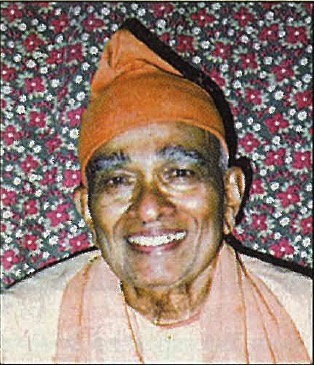BY SWAMI SASTRANANDA
Man (woman included) seeks and strives to be or have the best, the perfect, consciously or unconsciously, each in one’s own way. The quest is common, but the means adopted are innumerable. Man tries to become better, to have more power, knowledge, joy, peace and freedom. When he does succeed in his quest, he finds that the key to perfection is within oneself, and that the worlds “within” are immeasurably vaster, superior and more blessed than the worlds “outside.” Perfection is found to be one’s own true and abiding essence, luminous and blissful Satchitananda, as Vedanta terms it. It is all-pervading and not different from “Divinity.” It is this “Divine” which common people or various religions designate as “God,” yet which most people futilely seek for outside, until they are happily forced to turn within.
All noble or human quests for perfection have the same end, but each seeks or strives for it in one’s own limited and imperfect ways. But without realizing that each one’s way is unique and indispensable for that person, many unfortunately stress and even impose particular views and ways on all. That only makes for more confusion and strife among humans. On the other hand, those who have been blessed enough to experience the Truth rejoice not only in their own realization, but in the similar experiences of others, too. They genuinely hold all such quests as worthy of respect, support and needed succor. That makes a real and solid contribution for peace, harmony and progress. Such rare beings are the true sages, saints and gurus. Such an all-inclusive approach to the “Divine,” its actual experience and the consequent spontaneous expressing, constitute the true “religion.” All limited denominational religions are but imperfect facets of this one “religion,” and can never arrogate to themselves any sole and superior status as the one representative of God. Dogmatism or arrogance in this regard are hollow and ridiculous.
If, among the extant religions today, any approximates most to the place of honor, it can only be genuine Hinduism. It has a word of goodwill for all fellow seekers and never seeks to convert others to its own views and ways, to impose itself on others, be it by force or propaganda. Its very foundation rests on the great principle of unity in diversity, expressed in the millennia-old mantra, “Truth is one; wise people designate it variously,” and its modern version as voiced by Sri Ramakrishna, “As many faiths, so many paths.”
Thus for the true Hindu the holy task and duty, his core dharma, is somehow to experience the Divine Truth in oneself, and then allow it to function in its own way, even as the fragrance of a flower spreads beneficently in various directions. When this experience is very clear or powerful, it may on its own attract many others, too. Man can, at best, be a faithful and reverent channel for this omnipotent divine power, or shakti, to work out its own blessed purpose. One who has realized this Divine in oneself may witness it in others, too–nay in all creation. That results in leading a god-like life and serving fellow beings, as expressions of the same Divine, lovingly and reverently. This only serves to purify and bless the world, never to pollute it.
Swami Vivekananda, the modern-era spokesman of timeless Hinduism, disclosed, “Each soul is potentially divine. The goal is to manifest this Divinity within by controlling nature, external and internal. Do this by work or worship, or psychic control or philosophy–by one or more, or all of these and be free. This is the whole of religion. Doctrines or dogmas, or rituals or books, or temples, or forms are but secondary details.”
Thus, the most vital, holy duty of the true Hindu–nay, any worthy human–is to manifest this Divinity within in some way or another. It is for this that it is essential to control his inner and outer nature, viz., propensities of body, mind and ego, which distract him from his blessed, divine essence. The effort at self-control for a divine end is the Hindu’s real self discipline, or sadhana. It makes for real character-building, man-making and making of true, noble and godly humans. The greatest service that we can render to others thus becomes helping others, if possible, to manifest their own innate Divinity. The rest will take care of itself.
In the words of Swami Vivekananda, “First let us become gods and then help others to become gods. ‘Be and make.’ Let this be our motto.” That is dharma, morality or virtue, and whatever is opposed to it is adharma or vice. The virtues to be cultivated thus become dama, dana and daya, self-control, generosity and compassion–and satya, ahimsa, brahmacharya and aparigraha. Satya is truthfulness and integrity, which follows from the Divine being, Sat–the true and good. Ahimsa is nonharming of others, which follows from looking upon others as oneself. Brahmacharya or reverence for the Divine in others–especially in the opposite sex–never looking at them as only objects of sensual enjoyment or instruments for one’s own pleasure. Aparigraha is a simple, nonexploitive and nongrabbing life which enables a man to be truly honorable and nondependent.
Crowning all this, when the inner Divinity manifests, all the glory of Satchitananda, viz., strength and fearlessness, goodness, luminous wisdom, joy and love, radiates spontaneously. Such a blessed Hindu reveals a life full of gentleness, generosity, purity, calmness, introspection and spirituality. To lead earnestly such a life is a blessing to oneself and others, too.
That is the core message of Hinduism.
Swami Sastrananda, 80, a senior monk of the Ramakrishna Order, has served and taught Vedantic Hinduism for half a century in various centers. He is now retired at Vivekananda Ashram, Bangalore.
